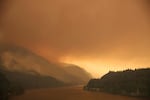As wildfires become larger and more frequent, air quality in Oregon has suffered. Days that hit air pollution levels considered dangerous for at least some people have increased sharply since 2015, according to a report from the state’s Department of Environmental Quality.
Because Oregon is such a large state, bad air day counts vary greatly by geography. But they have increased in all of the cities in the report.

Smoke from the Eagle Creek Wildfire fills the Columbia River Gorge in September 2017. Bad air quality days due to wildfire smoke from larger and more frequent fires have increased dramatically in Oregon since 2015.
Conrad Wilson / OPB
Air quality measurements test the amounts of pollutants in the air, including carbon monoxide and sulfur dioxide, to calculate how safe it is to breathe. Once the Air Quality Index, or AQI, gets to 151, it’s considered unhealthy for everyone. Higher AQI numbers indicate increasing health risks from breathing the air, especially for those with asthma or heart disease or who are older.
Portland had no unhealthy air days from wildfire smoke between 1987, when regular air quality measurements began, and 2014, according to the report. But from 2015 through 2022, it had seven unhealthy, three very unhealthy, and five hazardous days from wildfire smoke.
Klamath Falls and Medford each recorded around 20 unhealthy days before 2015, and more than 60 unhealthy days from 2015 to 2022. Both cities also saw an increase in very unhealthy days and hazardous days. Bend went from three unhealthy days before 2015 to more than 30 days that were either unhealthy, very unhealthy or hazardous.
Since 2010, the average number of acres burned per year has continued to rise. And looking to cities with consistent air quality tracking since the mid-1980s, it’s clear that the effect of wildfire smoke has become a much bigger issue since 2015.
